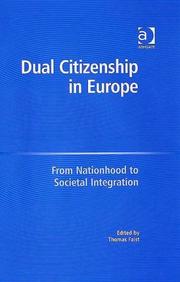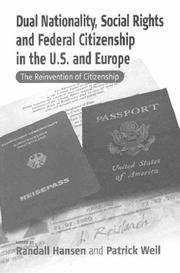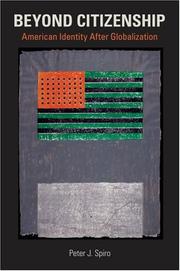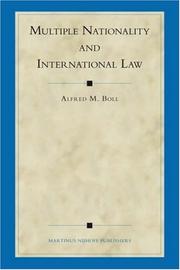| Listing 1 - 9 of 9 |
Sort by
|

ISBN: 9041119329 9786610468188 1417551399 1280468181 9047403185 9781417551392 Year: 2003 Publisher: The Hague New York Kluwer Law International
Abstract | Keywords | Export | Availability | Bookmark
 Loading...
Loading...Choose an application
- Reference Manager
- EndNote
- RefWorks (Direct export to RefWorks)
The increased emergence of dual and multiple nationality in our globalized world has recently led to public and scholarly debates on a number of resulting practical questions. This book comprehensively evaluates the legal status of dual nationals on the basis of a comparative analysis, with emphasis on practice and law in the United States of America, the Federal Republic of Germany, Turkey and other selected countries, comprising contributions of both academics and practitioners. Among the legal subjects examined more intensively are the exercise of political rights by dual nationals, including voting and office holding, performance of military service, loss and withdrawal of citizenship, and effects of dual nationality on judicial cooperation, as well as aspects of private international law. The authors pay attention to developmental trends and legal changes in various countries, and also to the philosophical and theoretical perspectives underlying various practices. Specific recommendations for states dealing with dual nationality complete the investigation.
Dual nationality --- Conflict of laws --- Citizenship --- Dual nationality. --- International comparison. --- Double nationality --- Dual allegiance --- Dual citizenship --- Nationality, Dual --- Nationality, Plural --- Plural nationality --- Law and legislation --- World politics.

ISBN: 1317147642 1317147634 1281103780 9786611103781 0754683524 9780754683520 9780754649144 0754649148 9781317147640 9781317147633 9781281103789 6611103783 9781315578231 9781317147626 9781138275584 1315578239 Year: 2007 Publisher: Aldershot, England ; Burlington, VT : Ashgate,
Abstract | Keywords | Export | Availability | Bookmark
 Loading...
Loading...Choose an application
- Reference Manager
- EndNote
- RefWorks (Direct export to RefWorks)
In an age of terrorism and securitized immigration, dual citizenship is of central concern. The contributors to this timely volume examine policies regarding dual citizenship across Europe, covering a wide spectrum of countries. The case studies explore the negotiated character and boundaries of political membership and the fundamental beliefs and arguments which have shaped debates and policies on citizenship.
Citizenship --- Dual nationality --- Double nationality --- Dual allegiance --- Dual citizenship --- Nationality, Dual --- Nationality, Plural --- Plural nationality --- Conflict of laws --- Law and legislation
Book
ISBN: 9780814724347 0814724345 9780814785829 0814785824 0814724418 Year: 2016 Publisher: New York, NY
Abstract | Keywords | Export | Availability | Bookmark
 Loading...
Loading...Choose an application
- Reference Manager
- EndNote
- RefWorks (Direct export to RefWorks)
Read Peter's Op-ed on Trump's Immigration Ban in The New York TimesThe rise of dual citizenship could hardly have been imaginable to a time traveler from a hundred or even fifty years ago. Dual nationality was once considered an offense to nature, an abomination on the order of bigamy. It was the stuff of titanic battles between the United States and European sovereigns. As those conflicts dissipated, dual citizenship continued to be an oddity, a condition that, if not quite freakish, was nonetheless vaguely disreputable, a status one could hold but not advertise. Even today, some Americans mistakenly understand dual citizenship to somehow be “illegal”, when in fact it is completely tolerated. Only recently has the status largely shed the opprobrium to which it was once attached.At Home in Two Countries charts the history of dual citizenship from strong disfavor to general acceptance. The status has touched many; there are few Americans who do not have someone in their past or present who has held the status, if only unknowingly. The history reflects on the course of the state as an institution at the level of the individual. The state was once a jealous institution, justifiably demanding an exclusive relationship with its members. Today, the state lacks both the capacity and the incentive to suppress the status as citizenship becomes more like other forms of membership. Dual citizenship allows many to formalize sentimental attachments. For others, it’s a new way to game the international system. This book explains why dual citizenship was once so reviled, why it is a fact of life after globalization, and why it should be embraced today.
Dual nationality --- Double nationality --- Dual allegiance --- Dual citizenship --- Nationality, Dual --- Nationality, Plural --- Plural nationality --- Citizenship --- Conflict of laws --- History. --- Law and legislation

ISBN: 1571818049 1571818057 9781571818058 9781571818041 1789204119 9781789204117 Year: 2002 Publisher: New York: Berghahn,
Abstract | Keywords | Export | Availability | Bookmark
 Loading...
Loading...Choose an application
- Reference Manager
- EndNote
- RefWorks (Direct export to RefWorks)
Dual nationality --- Conflict of laws --- Double nationalité --- Nationalité (Droit international privé) --- Citizenship --- Citizenship. --- Double nationalité --- Nationalité (Droit international privé) --- Dual nationality - United States --- Dual nationality - Europe --- Conflict of laws - Citizenship --- Double nationality --- Dual allegiance --- Dual citizenship --- Nationality, Dual --- Nationality, Plural --- Plural nationality --- Law and legislation
Book
ISBN: 1108566375 1108554172 1108676456 1108429157 9781108676458 9781108554176 9781108429153 9781108453189 110845318X 9781108453189 Year: 2018 Publisher: Cambridge [UK] New York, NY
Abstract | Keywords | Export | Availability | Bookmark
 Loading...
Loading...Choose an application
- Reference Manager
- EndNote
- RefWorks (Direct export to RefWorks)
Citizenship is no longer an exclusive relationship. Many people today are citizens of multiple countries, whether by birth, naturalization, or even through monetary means, with schemes fast-tracking citizenship applications from foreigners making large investments in the state. Moral problems surround each of those ways of acquiring a second citizenship, while retaining one's original citizenship. Multiple citizenship can also have morally problematic consequences for the coherence of collective decisions, for the constitution of the demos, and for global inequality. The phenomenon of multiple citizenship and its ramifications remains understudied, despite its magnitude and political importance. In this innovative book, Ana Tanasoca explores these issues and shows how they could be avoided by unbundling the rights that currently come with citizenship and allocating them separately. It will appeal to scholars and students of normative political theory, citizenship, global justice, and migration in political science, law, and sociology.
Dual nationality. --- Citizenship. --- Conflict of laws --- Citizenship --- Dual nationality --- Birthright citizenship --- Citizenship (International law) --- National citizenship --- Nationality (Citizenship) --- Political science --- Public law --- Allegiance --- Civics --- Domicile --- Political rights --- Double nationality --- Dual allegiance --- Dual citizenship --- Nationality, Dual --- Nationality, Plural --- Plural nationality --- Law and legislation
Book
ISBN: 1280569581 9786613599186 9004227210 9789004227217 9004227202 9789004227200 Year: 2012 Publisher: Leiden BRILL
Abstract | Keywords | Export | Availability | Bookmark
 Loading...
Loading...Choose an application
- Reference Manager
- EndNote
- RefWorks (Direct export to RefWorks)
The book examines the phenomenon of dual nationality in the European Union, particularly against the background of the status of European citizenship – a status that is linked to the nationality of each EU Member State. While the first part sets out the approach towards (dual) nationality in Public and Private International Law as well as in EU Law, the second part consists of an overview of the dual nationality regimes in France, Italy, the Netherlands and Spain. The book shows that the autonomy of Member States in the field of nationality law is becoming increasingly problematic for the EU, and the author takes the position that there is arguably a need for the (minimum) harmonization of European nationality laws.
Public welfare --- LAW / Constitutional --- LAW / Public --- Benevolent institutions --- Poor relief --- Public assistance --- Public charities --- Public relief --- Public welfare reform --- Relief (Aid) --- Social welfare --- Welfare (Public assistance) --- Welfare reform --- Human services --- Social service --- Law and legislation --- Government policy --- Dual nationality --- Double nationality --- Dual allegiance --- Dual citizenship --- Nationality, Dual --- Nationality, Plural --- Plural nationality --- Citizenship --- Conflict of laws --- Double nationalité --- Citoyenneté --- Dual nationality - France --- Dual nationality - Netherlands --- Dual nationality - Germany --- Dual nationality - Spain --- France --- Espagne --- Pays-Bas --- Italie

ISBN: 1281158909 0199722250 1435617843 9780199722259 0195152182 9780195152180 9781435617841 9781281158901 019020771X 0197718450 9786611158903 6611158901 Year: 2008 Publisher: Oxford [England] ; New York : Oxford University Press,
Abstract | Keywords | Export | Availability | Bookmark
 Loading...
Loading...Choose an application
- Reference Manager
- EndNote
- RefWorks (Direct export to RefWorks)
"American identity has always been capacious as a concept but narrow in its application. Citizenship has mostly been about being here, either through birth or residence. The territorial premises for citizenship have worked to resolve the peculiar challenges of American identity. But globalization is detaching identity from location. What used to define American was rooted in American space. Now one can be anywhere and be an American, politically or culturally. Against that backdrop, it becomes difficult to draw the boundaries of human community in a meaningful way. Longstanding notions of democratic citizenship are becoming obsolete, even as we cling to them. Beyond Citizenship charts the trajectory of American citizenship and shows how American identity is unsustainable in the face of globalization."- from Amazon.com
Citizenship --- Naturalization --- Dual nationality --- Noncitizens --- Equality before the law --- Undocumented immigrants --- Equal protection of the law --- Double nationality --- Dual allegiance --- Dual citizenship --- Nationality, Dual --- Nationality, Plural --- Plural nationality --- Conflict of laws --- Law and legislation --- Aliens --- Illegal aliens --- Enemy aliens --- Expatriates --- Foreign citizens (Aliens) --- Foreign population --- Foreign residents --- Foreigners --- Resident aliens --- Unnaturalized foreign residents --- Persons --- Deportees --- Exiles --- Immigrants --- Refugees --- Legal status, laws, etc. --- Illegal immigrants --- Non-citizens --- Unauthorized immigrants --- Undocumented aliens --- United States --- Illegal immigration. --- Children of illegal aliens --- Illegal alien children --- Irregular migration --- Unauthorized immigration --- Undocumented immigration --- Women illegal aliens --- Emigration and immigration --- Human smuggling --- Noncitizen detention centers

ISBN: 9789004148383 9004148388 9786611396909 1281396907 9047408594 9789047408598 Year: 2007 Volume: v. 57 Publisher: Leiden M. Nijhoff
Abstract | Keywords | Export | Availability | Bookmark
 Loading...
Loading...Choose an application
- Reference Manager
- EndNote
- RefWorks (Direct export to RefWorks)
This book is a comprehensive overview of multiple nationality in international law, and contains a survey of current State practice covering over 75 countries. It examines the topic in light of the historical treatment of multiple nationality by States, international bodies and commentators, setting out the general trends in international law and relations that have influenced nationality. While the book's purpose is not to debate the merits of multiple nationality, but to present actual state practice, it does survey arguments for and against multiple nationality, and considers States' motivations in adopting a particular attitude toward the topic. As a reference work, the volume includes a detailed examination of the nature of nationality under international law and the concepts of nationality and citizenship under municipal law. The survey of State practice also constitutes a valuable resource for practitioners.
Dual nationality. --- Conflict of laws --- International law. --- Nationalities, Principle of. --- Human rights. --- Double nationalité --- Nationalité (Droit international privé) --- Droit international --- Nationalités, Principe des --- Droits de l'homme (Droit international) --- Citizenship. --- Dual nationality --- International law --- Nationalities, Principle of --- Human Rights --- Citizenship --- Double nationalité --- Nationalité (Droit international privé) --- Nationalités, Principe des --- Basic rights --- Civil rights (International law) --- Human rights --- Rights, Human --- Rights of man --- Human security --- Transitional justice --- Truth commissions --- Nationality, Principle of --- Principle of nationalities --- Minorities --- Nation-state --- Nationalism --- Self-determination, National --- Law of nations --- Nations, Law of --- Public international law --- Law --- Double nationality --- Dual allegiance --- Dual citizenship --- Nationality, Dual --- Nationality, Plural --- Plural nationality --- Law and legislation --- Droit international privé --- Conflict of laws - Citizenship --- Nationalités multiples
Book
ISBN: 0804784752 9780804784757 9780804782982 0804782989 Year: 2013 Publisher: Stanford, Calif. Stanford University Press
Abstract | Keywords | Export | Availability | Bookmark
 Loading...
Loading...Choose an application
- Reference Manager
- EndNote
- RefWorks (Direct export to RefWorks)
It is commonly assumed that there is an enduring link between individuals and their countries of citizenship. Plural citizenship is therefore viewed with skepticism, if not outright suspicion. But the effects of widespread global migration belie common assumptions, and the connection between individuals and the countries in which they live cannot always be so easily mapped. In The Scramble for Citizens, David Cook-Martín analyzes immigration and nationality laws in Argentina, Italy, and Spain since the mid 19th century to reveal the contextual dynamics that have shaped the
Dual nationality --- Citizenship --- Double nationality --- Dual allegiance --- Dual citizenship --- Nationality, Dual --- Nationality, Plural --- Plural nationality --- Conflict of laws --- Law and legislation --- Argentina --- Italy --- Spain --- Espagne --- Espainiako Erresuma --- España --- Espanha --- Espanja --- Espanya --- Estado Español --- Hispania --- Hiszpania --- Isupania --- Kingdom of Spain --- Regne d'Espanya --- Reiaume d'Espanha --- Reino de España --- Reino d'Espanya --- Reinu d'España --- Sefarad --- Sepharad --- Shpanie --- Shpanye --- Spanien --- Spanish State --- Supein --- イスパニア --- スペイン --- Italia --- Italian Republic (1946- ) --- Italianska republika --- Italʹi︠a︡nskai︠a︡ Rėspublika --- Italie --- Italien --- Italii︠a︡ --- Italii︠a︡ Respublikasi --- Italiĭsʹka Respublika --- Itālija --- Itālijas Republika --- Italijos Respublika --- Italikē Dēmokratia --- Īṭāliyā --- Italiya Respublikasi --- It'allia --- It'allia Konghwaguk --- İtalya --- İtalya Cumhuriyeti --- Iṭalyah --- Iṭalye --- Itaria --- Itaria Kyōwakoku --- Jumhūrīyah al-Īṭālīyah --- Kgl. Italienische Regierung --- Königliche Italienische Regierung --- Laško --- Lýðveldið Ítalía --- Olasz Köztársaság --- Olaszország --- Regno d'Italia (1861-1946) --- Repubblica italiana (1946- ) --- Republiḳah ha-Iṭalḳit --- Włochy --- Yidali --- Yidali Gongheguo --- Ιταλική Δημοκρατία --- Ιταλία --- Итальянская Республика --- Италианска република --- Италия --- Италия Республикаси --- Італьянская Рэспубліка --- Італія --- Італійська Республіка --- איטאליע --- איטליה --- רפובליקה האיטלקית --- إيطاليا --- جمهورية الإيطالية --- イタリア --- イタリア共和国 --- 意大利 --- 意大利共和国 --- 이탈리아 --- 이탈리아 공화국 --- Sardinia (Italy) --- Argenṭinah --- Argenṭine --- Argentine Confederation (1851-1861) --- Argentine Nation --- Argentine Republic --- Aruzenchin --- Confederación Argentina (1851-1861) --- Nación Argentina --- República Argentina --- アルゼンチン --- Provincias Unidas del Río de la Plata --- Emigration and immigration --- Government policy.
| Listing 1 - 9 of 9 |
Sort by
|

 Search
Search Feedback
Feedback About UniCat
About UniCat  Help
Help News
News